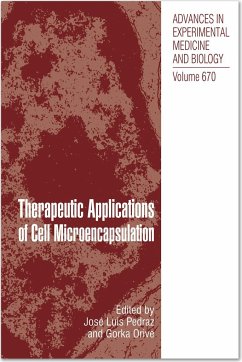The main objective of this book has been to analyze in depth and discuss the different aspects related to the design and elaboration of cell-enclosing microcapsules, even the regulatory features and clinical trials under development. These improvements will lead to progression in this therapeutic approach which may become one day closer to a realistic proposal for clinical application.
The advances in drug delivery technology have enabled a new era of drug discovery and development. In this regard, cell microencapsulation is a technology that opens new venues and possibilities to the administration of new active principles and may be the key to solve several issues related to the correct administration of new therapeutic agents to finally success in the clinical setting.
The editors believe that this technology may have important applicability not only in the field of drug delivery (to treat diseases such as cancer, neurodegenerative disorders, metabolic diseases etc) but also in cellular therapy and tissue regeneration among others.
Due to the organization of the chapters, this book can be read at different levels and readers may analyze from basic aspects of encapsulation, biomaterials, clinical applications and regulatory and industrial issues of this technology. Due to this, the book could be useful for both graduate and PhD students belonging to the pharmaceutical, engineering and biomedical fields. Nevertheless, we hope that this book is also useful to expert researchers who may find information and new ideas about the cell microencapsulation area.
The advancement of science is ever more contingent upon the interaction of experts vast amount of scientific information being gathered every day that exceeds the ability of any one scientist to acquire. As an illustration of the frantic pace of scientific disc- more acute in the case of scientific fields at the interface of different and seemingly distant areas of study. Amidst these, the field of cell encapsulation brings together an array of diverse disciplines such as molecular biology and biopolymers, gene therapy and inorganic membranes, stem cell biology and physicochemistry, immunology and nanotechnology. Clearly, such range of topics is too broad for any individual scientist the state-of-the-art in the field of cell encapsulation. At the core of this technology, there is an interaction of physicochemical and biological elements forming three distinct layers of complexity. First, the chemistry of the biopolymer dictates the degree of protein adsorption, vascularization, tox- ity and biocompatibility of the microcapsules. Advances in biopolymer science are providing solutions to overcome existing challenges and to improve microcapsules as delivery vehicles. Second, the choice of cells, and more precisely the plethora of in determining the immune response elicited by the host to implanted microcapsules.
The advances in drug delivery technology have enabled a new era of drug discovery and development. In this regard, cell microencapsulation is a technology that opens new venues and possibilities to the administration of new active principles and may be the key to solve several issues related to the correct administration of new therapeutic agents to finally success in the clinical setting.
The editors believe that this technology may have important applicability not only in the field of drug delivery (to treat diseases such as cancer, neurodegenerative disorders, metabolic diseases etc) but also in cellular therapy and tissue regeneration among others.
Due to the organization of the chapters, this book can be read at different levels and readers may analyze from basic aspects of encapsulation, biomaterials, clinical applications and regulatory and industrial issues of this technology. Due to this, the book could be useful for both graduate and PhD students belonging to the pharmaceutical, engineering and biomedical fields. Nevertheless, we hope that this book is also useful to expert researchers who may find information and new ideas about the cell microencapsulation area.
The advancement of science is ever more contingent upon the interaction of experts vast amount of scientific information being gathered every day that exceeds the ability of any one scientist to acquire. As an illustration of the frantic pace of scientific disc- more acute in the case of scientific fields at the interface of different and seemingly distant areas of study. Amidst these, the field of cell encapsulation brings together an array of diverse disciplines such as molecular biology and biopolymers, gene therapy and inorganic membranes, stem cell biology and physicochemistry, immunology and nanotechnology. Clearly, such range of topics is too broad for any individual scientist the state-of-the-art in the field of cell encapsulation. At the core of this technology, there is an interaction of physicochemical and biological elements forming three distinct layers of complexity. First, the chemistry of the biopolymer dictates the degree of protein adsorption, vascularization, tox- ity and biocompatibility of the microcapsules. Advances in biopolymer science are providing solutions to overcome existing challenges and to improve microcapsules as delivery vehicles. Second, the choice of cells, and more precisely the plethora of in determining the immune response elicited by the host to implanted microcapsules.








